Mike Rounds, Joe Manchin seek back pay for military officers affected by Tommy Tuberville holds
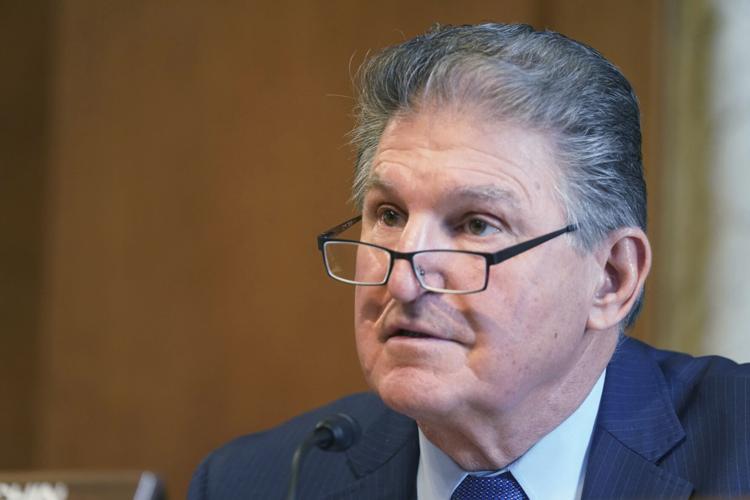
by South Dakota Searchlight staff, Alabama Reflector This story was originally published on South Dakota Searchlight. Senators from South Dakota and West Virginia want hundreds of military officers to receive back pay after an Alabama senator held up their promotions for most of the year. Mike Rounds, a South Dakota Republican, and Joe Manchin, a West Virginia Democrat, announced Friday the introduction of the Military Personnel Confirmation Restoration Act of 2023. The bill comes after Sen. Tommy Tuberville, R-Alabama, ended holds he had placed on hundreds of military promotions in protest of a Pentagon abortion policy. The policy allows armed services members time off and travel reimbursement if they seek an abortion in a state where it remains legal. On Tuesday, Tuberville said he would lift all of his holds except for a handful of four-star general nominees. The men and women who wear the uniform of the United States of America should not be negatively impacted by political squabbles. – Sen. Mike Rounds, R-South Dakota Rounds said Friday in a news release that he, like Tuberville, disagrees with the Pentagon policy and supports “a member of the Senate’s right to hold any nomination.” But, Rounds added, “the men and women who wear the uniform of the United States of America should not be negatively impacted by political squabbles.” “I am pleased to introduce this bipartisan legislation with Senator Manchin to do the right thing and provide military officers and their families with the benefits they have earned for their decades of service and sacrifice,” Rounds said. The press release from Rounds included comments from Manchin, who focused on the affected service members and did not address the abortion policy or the right of senators to hold up nominations. “These men and women are true American heroes and the least we can do in Congress is restore the benefits they have earned and deserve,” Manchin said. The bill co-sponsors include Tuberville. Other co-sponsors are Angus King, I-Maine; Joni Ernst, R-Iowa; Kirsten Gillibrand, D-New York; Richard Blumenthal, D-Connecticut; and Tim Kaine, D-Virginia. South Dakota Searchlight is part of States Newsroom, a network of news bureaus supported by grants and a coalition of donors as a 501c(3) public charity. South Dakota Searchlight maintains editorial independence. Follow South Dakota Searchlight on Facebook and Twitter. Alabama Reflector is part of States Newsroom, a network of news bureaus supported by grants and a coalition of donors as a 501c(3) public charity. Alabama Reflector maintains editorial independence. Follow Alabama Reflector on Facebook and Twitter.
Katie Britt and Tommy Tuberville join bipartisan group to support rural hospitals

On Friday, U.S. Senators Katie Britt and Tommy Tuberville joined a bipartisan group of fourteen Senators urging the extension of a policy that is helping rural hospitals in states like Alabama continue to deliver quality care. The two Alabama Republicans joined in a letter to Centers for Medicare and Medicaid Services (CMS) Administrator Chiquita Brooks-LaSure formally requesting a four-year extension of the Low Wage Index Hospital Policy, which allows hospitals in rural areas to compete for and retain high-quality staff by increasing reimbursements to hospitals in rural areas with lower overall wages. Without action, Medicare payments to these hospitals will reduce after September 30, 2023. Sen. Britt is a member of the subcommittee for Labor, Health and Human Services, Education, and Related Agencies of the Senate Committee on Appropriations. “Our rural families and communities depend on the medical services and potentially life-saving treatments that local hospitals provide,” said Sen. Britt. “Every Alabamian deserves access to quality care and the opportunity to thrive in safe, strong communities – no matter their zip code.” The four-year AWI adjustment by CMS for bottom quartile hospitals was first passed by the Trump administration in August 2019. Then, Sens. Richard Shelby and Doug Jones represented Alabama in the Senate. “For two decades, Alabama has been fighting the unfair Medicare reimbursements and today receives a rate that is just 67 percent of the national average,” Sen. Jones explained in 2019. “This rule adjustment will bring balance to Medicare reimbursement for Alabama, particularly our rural hospitals and hospitals across the country,” explained then-Sen. Shelby. “For years, I’ve been working with Alabama’s hospitals and the delegation to advocate for increased Medicare reimbursements for Alabama’s hospitals, which are currently reimbursed at the lowest rates in the country,” Congresswoman Terri Sewell stated when the rule was passed. “Today’s announcement is great news for Alabama’s hospitals, especially those in rural areas of the state where every dollar counts. With over 88 percent of rural Alabama hospitals operating in the red, it is critical that we do everything we can to help our hospitals provide the services needed to keep Alabamians healthy. Recalculating the way Medicare reimburses Alabama hospitals is a crucial step in achieving that goal.” “Unfortunately, due to disruptions in the marketplace caused by the COVID-19 pandemic, we have not had the opportunity to see the true impact of the Low Wage Index Hospital Policy envisioned by CMS,” the Senators wrote in their letter. “Extending the Low Wage Index Hospital Policy for four additional years will allow hospitals and the agency to better understand the policy’s true impact in a more normal environment.” Senators Britt and Tuberville were joined by Senators Mark Warner (D-Virginia), Marsha Blackburn (R-Tennessee), Tim Kaine (D-Virginia), Joe Manchin (D-West Virginia), John Boozman (R-Arkansas), Shelley Moore Capito (R-West Virginia), Roger Wicker (R-Mississippi), Cindy Hyde-Smith (R-Mississippi), Bill Hagerty (R-Tennessee), James Lankford (R-Oklahoma), Tim Scott (R-South Carolina), and Tom Cotton (R-Arkansas). Without a renewal and extension of the rule, CMS will revert back to compensating rural hospitals at 60 to 75% of the rates as hospitals in many major metropolitan areas based on the assumption that the cost of living and, thus, wages are less in the rural areas. The difficulty with that theory is that there is an intense nationwide competition for medical professionals who all go to the same medical and nursing schools. Rural hospitals already struggle to hire competent medical professionals due to the small rural populations. This means fewer patients seeking care, particularly specialized care, than in a major city hospital. If Medicare and Medicaid reimburse those hospitals for significantly less than the major hospitals will, then attracting and retaining staff at the rural hospitals becomes problematic. To connect with the author of this story or to comment, email brandonmreporter@gmail.com.
Senate Dems push new voting bill, and again hit GOP wall
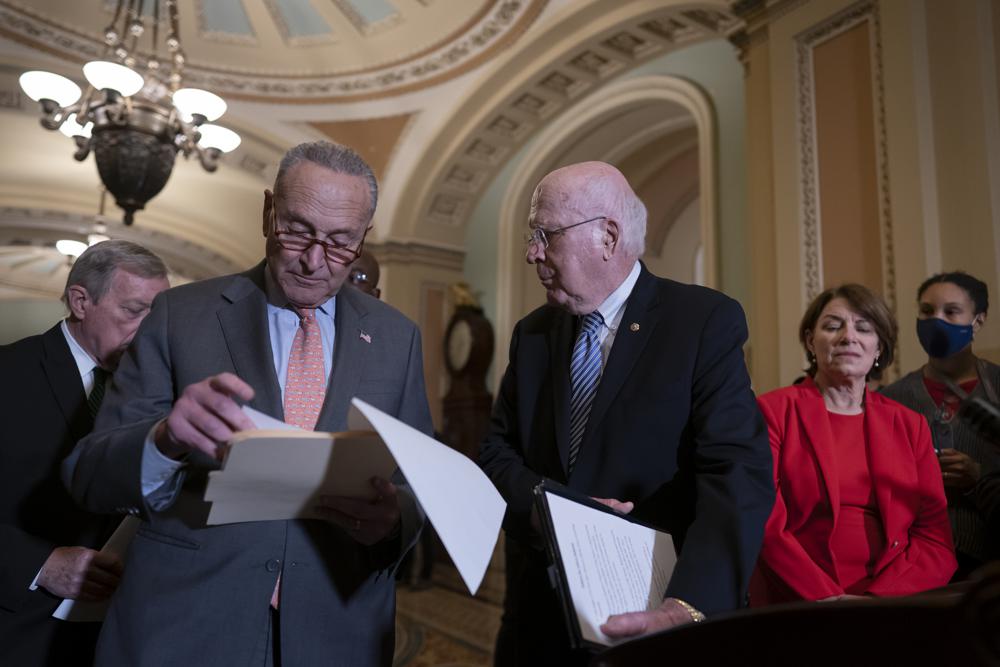
If at first you don’t succeed, make Republicans vote again. That’s the strategy Senate Majority Leader Chuck Schumer appears to be pursuing as the New York Democrat forced another test vote Wednesday on legislation to overhaul the nation’s election laws. For the fourth time since June, Republicans blocked it. Democrats entered the year with unified, albeit narrow, control of Washington, and a desire to counteract a wave of restrictive new voting laws in Republican-led states, many of which were inspired by Donald Trump’s false claims of a stolen 2020 election. But their initial optimism has given way to a grinding series of doomed votes that are meant to highlight Republican opposition but have done little to advance a cause that is a top priority for the party ahead of the 2022 midterm elections. The Senate voted against debating voting legislation Wednesday, with Republicans this time filibustering an update to the landmark Voting Rights Act, a pillar of civil rights legislation from the 1960s. GOP senators oppose the Democratic voting bills as a “power grab.” “This is a low, low point in the history of this body,” Schumer said after the failed vote, later adding, “The Senate is better than this.” The stalemate is forcing a reckoning among Senate Democrats about whether to make changes to the filibuster rule, which requires 60 votes for legislation to advance. That could allow them to muscle legislation through but would almost certainly come back to bite them if and when Republicans take back control of the chamber. Earlier Wednesday, Schumer met with a group of centrist Democrats, including Sens. Jon Tester of Montana, Angus King of Maine, and Tim Kaine of Virginia, for a “family discussion” about steps that could be taken to maneuver around Republicans. That’s according to a senior aide who requested anonymity to discuss private deliberations. But it’s also a move opposed by moderate Sens. Kyrsten Sinema of Arizona and Joe Manchin of West Virginia. Without their support, Democrats won’t have the votes needed to make a change. Time is ticking down. Redistricting of congressional districts (a once-in-a-decade process Democrats want to overhaul to make less partisan) is already underway. And the Senate poised to split town next week for a home-state work period. “Senate Democrats should stay in town and focus on the last act in this battle,” said Fred Wertheimer, who leads the good government group Democracy 21. The latest measure blocked by Republicans Wednesday is different from an earlier voting bill from Democrats that would have touched on every aspect of the electoral process. It has a narrower focus and would restore the Justice Department’s ability to police voting laws in states with a history of discrimination. The measure drew the support of one Republican, Alaska Sen. Lisa Murkowski after Democrats agreed to make changes that she sought. But all other Republicans opposed opening debate on the bill. “Every time that Washington Democrats make a few changes around the margins and come back for more bites at the same apple, we know exactly what they are trying to do,” said Senate Minority Leader Mitch McConnell, who slammed the vote as “political theatre” on a trumped-up a “go-nowhere bill.” Murkowski, too, said she still had underlying issues with the bill as written while criticizing Schumer’s decision to force repeated “show votes.” “Let’s give ourselves the space to work across the aisle,” she said Wednesday. “Our goal should be to avoid a partisan bill, not to take failing votes over and over.” The Democrats’ John Lewis Voting Rights Advancement Act, named for the late Georgia congressman who made the issue a defining one of his career, would restore voting rights protections that have been dismantled by the Supreme Court. Under the proposal, the Justice Department would again police new changes to voting laws in states that have racked up a series of “violations,” drawing them into a mandatory review process known as “preclearance.” The practice was first put in place under the Voting Rights Act of 1965. But it was struck down by a conservative majority on the Supreme Court in 2013, which ruled the formula for determining which states needed their laws reviewed was outdated and unfairly punitive. The court did, however, say that Congress could come up with a new formula. The bill does just that. A second ruling from the high court in July made it more difficult to challenge voting restrictions in court under another section of the law. The law’s “preclearance” provisions had been reauthorized by Congress with overwhelming bipartisan support five times since it was first passed decades ago. But after the Supreme Court’s 2013 ruling, Republican support for the measure cratered. Though the GOP has shown no indication that its opposition will waver, there are signs that some of the voting changes Democrats seek aren’t as electorally advantageous for the party as some hope. Republican Glenn Youngkin’s victory in Virginia’s Tuesday gubernatorial election offers the latest test case. Democrats took control of all parts of Virginia’s government in 2019 and steadily started liberalizing the state’s voting laws. They made mail voting accessible to all and required a 45-day window for early voting, among the longest in the country. This year they passed a voting rights act that made it easier to sue for blocking ballot access. But those changes didn’t hurt Youngkin, who comfortably beat Democrat Terry McAuliffe, a popular former governor seeking a valedictory term. That’s still unlikely to change Republicans’ calculus. “Are we all reading the tea leaves from Virginia? Yes, absolutely,” Murkowski said. “Will it be something colleagues look to? It’s just one example.” Democratic frustration is growing, meanwhile leading to increasingly vocal calls to change the filibuster. “We can’t even debate basic bills,” said Minnesota Sen. Amy Klobuchar, a Democrat. “The next step is to work on ideas to restore the Senate.” Republished with the permission of the Associated Press.
Tommy Tuberville joins Raphael Warnock and other leaders in bipartisan support for peanut farmers

Senators Tommy Tuberville and Raphael Warnock led 17 colleagues in a bipartisan push to reduce restrictive trade barriers and expand export market access for domestic peanut farmers and processors. The letter was sent to U.S. Department of Agriculture (USDA) Secretary Tom Vilsack and U.S. Trade Representative (USTR) Ambassador Katherine Tai. According to Tuberville’s press release, removing trade barriers for peanut farmers and processors would give a financial boost to the domestic peanut sector, increase international market access, and create job opportunities across the country. The letter states, “As U.S. Senators who proudly represent peanut farmers in our states, we strongly support joint efforts by USDA and USTR to engage with your E.U. counterparts with the goal of reducing existing non-tariff trade barriers on peanut exports. Increased market access will ultimately benefit the peanut farmers in our states, and we stand ready to support your efforts on their behalf.” Sen. Warnock stated on Twitter, “With GA leading the nation in peanut production, I was proud to lead a bipartisan group of Senators in pushing @USTradeRep & @USDA to expand export market access for our hardworking domestic farmers & processors. When we champion our farmers, we champion GA & our nation.” With GA leading the nation in peanut production 🥜, I was proud to lead a bipartisan group of Senators in pushing @USTradeRep & @USDA to expand export market access for our hardworking domestic farmers & processors. When we champion our farmers, we champion GA & our nation. — Senator Reverend Raphael Warnock (@SenatorWarnock) June 23, 2021 The senators who signed the letter include Senators John Boozman (R-AR), Richard Burr (R-NC), Bill Cassidy (R-LA), Tom Cotton (R-AR), John Cornyn (R-TX), Ted Cruz (R-TX), Lindsey Graham (R-SC), Cindy Hyde-Smith (R-MS), Tim Kaine (D-VA), Jon Ossoff (D-GA), Marco Rubio (R-FL), Rick Scott (R-FL), Tim Scott (R-SC), Richard Shelby (R-AL), Thom Tillis (R-NC), Mark Warner (D-VA), and Roger Wicker (R-MS). A copy of the letter can be found here and below: Dear Secretary Vilsack and Ambassador Tai, We write to bring your attention to ongoing nontariff trade barriers from the European Union (E.U.) affecting the domestic peanut sector. We encourage the U.S. Department of Agriculture (USDA) and the Office of the U.S. Trade Representative (USTR) to prioritize interagency collaboration and industry engagement in order to negotiate an effective solution with your E.U. counterparts that will ultimately allow increased market access for U.S. peanuts. According to data published by USDA, domestic peanut farmers produced over 1.6 million acres of peanuts in 2020 with a farm gate value over $1.2 billion. Due to their susceptibility to naturally-occurring aflatoxin, domestic peanut growers are subject to USDA testing to ensure all peanuts harvested for human consumption are safe to enter the food supply. U.S. growers have a long history of partnering with USDA to ensure their harvest is safe, with USDA also working on research initiatives to address the underlying causes of aflatoxin contamination and to improve post-harvest handling. Collectively, these efforts demonstrate that U.S. farmers and government officials are actively working to ensure that peanuts produced domestically are safe. In 2020, an estimated 668,000 metric tons of U.S. produced peanuts were exported to international markets. Unfortunately, stringent E.U. testing requirements for aflatoxin are preventing increased U.S. exports into this high-value market. In recent years, the U.S. industry estimates they have lost approximately $170 million in sales into the E.U. due to difficulties presented by these burdensome testing requirements. A review of data from the first quarter 2021 indicates an additional $130 million in anticipated lost sales. Without efforts to negotiate a workable solution that will increase opportunities for domestic peanut operations, our farmers and businesses will continue to struggle with prohibitive requirements set by international partners. As U.S. Senators who proudly represent peanut farmers in our states, we strongly support joint efforts by USDA and USTR to engage with your E.U. counterparts with the goal of reducing existing non-tariff trade barriers on peanut exports. Increased market access will ultimately benefit the peanut farmers in our states, and we stand ready to support your efforts on their behalf. Thank you for consideration of this request.
Voting bill showdown looms as GOP rejects Manchin plan
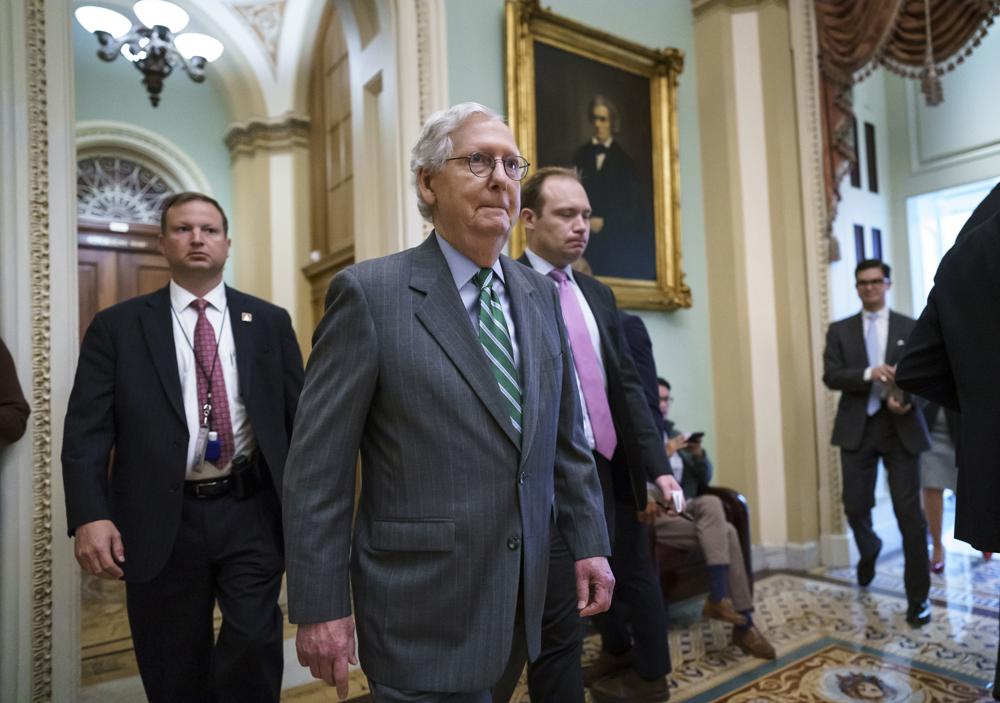
The Senate is set for a key vote Tuesday on a sweeping rewrite of voting and election law, setting up a dramatic test of Democratic unity on a top priority that Republicans are vowing to block. Democrats appeared to be coalescing Thursday around changes to the bill that could win the support of moderate West Virginia Sen. Joe Manchin, the lone Democratic holdout on the legislation. Yet, they still faced lockstep Republican opposition that will likely leave Democrats back where they started: lacking the votes to overcome a Republican filibuster. Senate Minority Leader Mitch McConnell, R-Ky., called Manchin’s proposal “equally unacceptable.” “Republicans are digging in their heels,” said Sen. Chris Murphy of Connecticut. “They’ve made it pretty clear this week that there’s nothing they’re willing to support.” The bill, known as the For the People Act, has been touted as Democrats’ answer to a state level-GOP push to enact voting restrictions following the 2020 election. It passed the House in March but has bogged down in the Senate as Democrats have debated among themselves — with Manchin ultimately declaring he couldn’t vote for it because it lacked bipartisan support. Yet Manchin’s position has evolved, and compromise appeared to be nearing after he proposed a series of changes this week to narrow its scope. His proposal received a boost Thursday when Stacey Abrams, a former Georgia gubernatorial candidate who is a leading Democratic voice on voting rights, said she “absolutely” supported it. “What Sen. Manchin is putting forward are some basic building blocks that we need to ensure that democracy is accessible,” Abrams told CNN. Still, in a narrowly divided Senate where Democrats must count on Vice President Kamala Harris to cast tie-breaking votes, any compromise will likely be for naught unless changes are made to Senate filibuster rules, which Manchin and others oppose. For now, it takes 60 votes to overcome a filibuster and advance legislation. Over a dozen Senate Republicans took turns at the microphone during a Thursday news conference to denounce the bill, which they view as a federal overreach into state and local elections. McConnell predicted all Republicans would remain in lockstep opposition regardless of what changes are made. Sen. Roy Blunt, the No. 4 ranking Senate Republican, noted the endorsement by Abrams, who is a lightning rod for GOP criticism. “I actually think when Stacey Abrams immediately endorsed Sen. Machin’s proposal, it became the Stacey Abrams (bill), not the Joe Manchin (bill),” he told reporters Thursday. As written, the Democrats’ bill would bring about the largest overhaul of U.S. voting in a generation, touching nearly every aspect of the electoral process. It would blunt laws erected in the name of election security, like voter ID requirements, while curtailing the influence of big money in politics. It would create a nonpartisan process for redrawing congressional districts, expand mail voting and early voting, restore the rights of felons to cast a ballot, and scores of other provisions. Manchin’s counter-offer, which is intended to entice GOP support, would leave significant portions of the sprawling bill intact while curtailing, rewriting, or eliminating other key parts. “Color me a little a little skeptical,” Democratic Sen. Tim Kaine of Virginia said of the possibility of bipartisanship. What will ultimately come to the floor for a vote Tuesday remains unclear. Also not certain: whether Manchin will vote for it. “We’ll see what bill we have,” he told reporters Thursday. “We don’t know what bill we’re going to have.” A national voter ID requirement favored by Manchin has emerged as one sticking point with some Democrats. Manchin’s proposal is far softer than the strict photo ID requirements adopted by some states. It would require all states to check ID, but various documents, including a utility bill, could be used instead of a photo ID, a requirement already adopted by 15 states, including Manchin’s West Virginia. “That is what we’re negotiating,” said Minnesota Sen. Amy Klobuchar, who is playing a lead role in guiding the legislation. Polls have shown notable bipartisan support for voter ID requirements, and Democrats in their elections overhaul focused on the strictest ID laws. In the current Senate bill, Democrats would require states with an ID law to allow voters who show up without identification to cast a regular ballot as long as they sign an affidavit under penalty of perjury. “We might squabble about one or two things,” said Sen. Raphael Warnock of Georgia. “But I am not about to sacrifice the good in the pursuit of the perfect.” Klobuchar said she would continue to work on the bill over the weekend and was optimistic all 50 Senate Democrats would support it. “If we reach unity on a voting bill in the Democratic Party, with all of the debates we’ve been having over the last few months, I don’t think anything’s over yet,” she said. Republished with the permission of the Associated Press.
Tommy Tuberville joins other leaders to change sexual assault investigations in the military
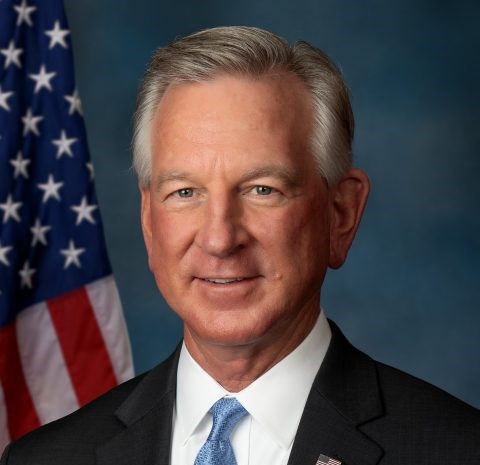
U.S. Senator Tommy Tuberville has joined a bipartisan group of senators to support a bill that will change the way the military conducts sexual assault investigations and prosecutions. Tuberville, a member of the Senate Armed Services Committee Subcommittee on Personnel, joined U.S. Senators Kirsten Gillibrand (D-NY), Chuck Grassley (R-IA), Joni Ernst (R-IA), Richard Blumenthal (D-CT), Ted Cruz (R-TX), Jeanne Shaheen (D-NH), Mark Kelly (D-AZ), and 28 other Senators to introduce the Military Justice Improvement and Increasing Prevention Act. According to the press release, the legislation “keeps the prosecution of sexual assault crimes within the military but moves the decision to prosecute to independent, trained, professional military prosecutors, and provides for several new prevention provisions such as better training for commanders and increased physical security measures, while ensuring that commanders still have the ability to provide strong leadership and ensure a successful command climate.” Tuberville stated, “Our men and women in uniform sacrifice every day to keep us safe, often working in some pretty unsafe places around the world. The last thing they should be worrying about is whether they’re unsafe within their ranks, and they certainly shouldn’t have to fear retaliation if they report a sexual assault. This bill is what happens when a bipartisan group of senators come together to get something done. I’m thankful that Senator Gillibrand and Senator Ernst have led the charge, and I’m glad to join my colleagues in support of this bill that will help improve the way the military handles sexual assaults so survivors can get the justice they deserve.” The bill was introduced in 2019, but did not receive a vote. Specifically, the legislation would: Move the decision on whether to prosecute serious crimes to independent, trained, and professional military prosecutors, while leaving misdemeanors and uniquely military crimes within the chain of command. Ensure the Department of Defense supports criminal investigators and military prosecutors through the development of unique skills needed to properly handle investigations and cases related to sexual assault and domestic violence. Require the Secretary of Defense to survey and improve the physical security of military installations– including locks, security cameras, and other passive security measures – to increase safety in lodging and living spaces for service members. Increase, and improve training and education on military sexual assault throughout our armed services. Kirsten Gillibrand stated on Twitter, “Here’s a bipartisan mission we can all support: Survivors of military sexual assault deserve justice. I’m proud to have @JoniErnst join me this week to introduce our new, improved bill to reform the military justice system and invest in prevention.” Here’s a bipartisan mission we can all support: Survivors of military sexual assault deserve justice. I’m proud to have @joniernst join me this week to introduce our new, improved bill to reform the military justice system and invest in prevention. https://t.co/pYYUL6IRyA — Kirsten Gillibrand (@SenGillibrand) April 27, 2021 The legislation is cosponsored by U.S. Senators Kirsten Gillibrand (D-NY), Chuck Grassley (R-IA), Joni Ernst (R-IA), Richard Blumenthal (D-CT), Ted Cruz (R-TX), Jeanne Shaheen (D-NH), Tammy Baldwin (D-WI), Chris Van Hollen (D-MD), Angus King (I-ME), Michael Braun (R-IN), Dick Durbin (D-IL), Tammy Duckworth (D-IL), Michael Bennet (D-CO), Rand Paul (R-KY), Chris Coons (D-DE), Mark Kelly (D-AZ), Sherrod Brown (D-OH), Bob Casey Jr. (D-PA), Maggie Hassan (D-NH), Mazie K. Hirono (D-HI), Amy Klobuchar (D-MN), Patrick Leahy (D-VT),Elizabeth Warren (D-MA), Ron Wyden (D-OR), Cynthia Lummis (R-WY), Dianne Feinstein (D-CA), Catherine Cortez Masto (D-NV), Raphael Warnock (D-GA), Alex Padilla (D-CA), Shelley Moore Capito (R-WV), Gary C. Peters (D-MI), Tim Kaine (D-VA), Tina Smith (D-MN), Bob Menendez (D-NJ), and Martin Heinrich (D-NM).
Joe Biden hopes South Carolina win means a Super Tuesday boost
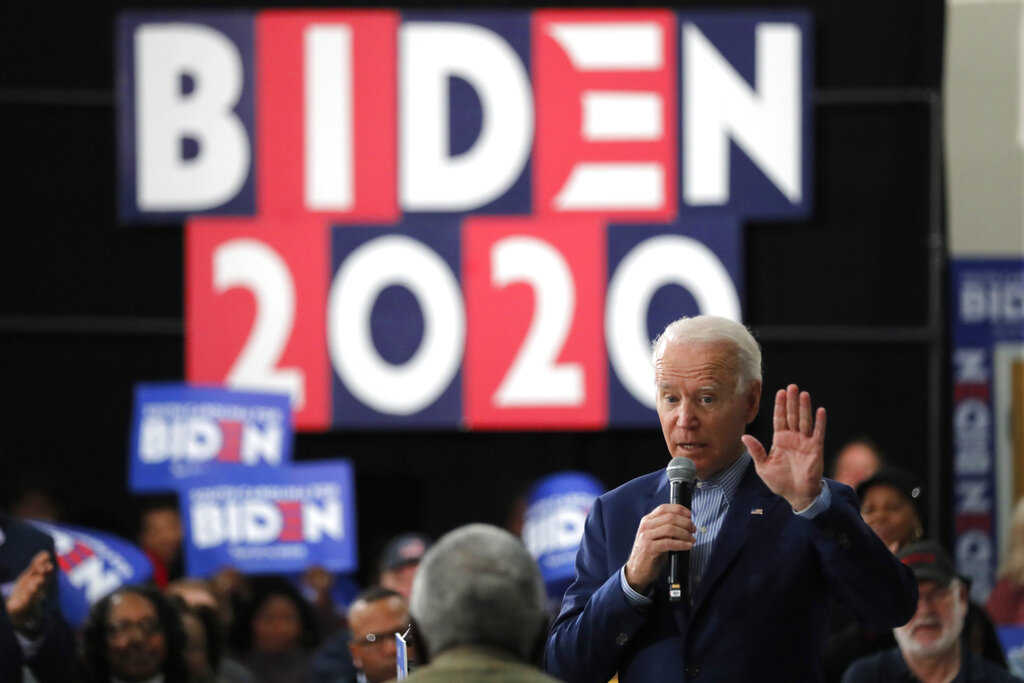
Biden so far has failed to live up to expectations in the three states that have held their primary or caucus to date.
Senate moves to limit Donald Trump on military force against Iran
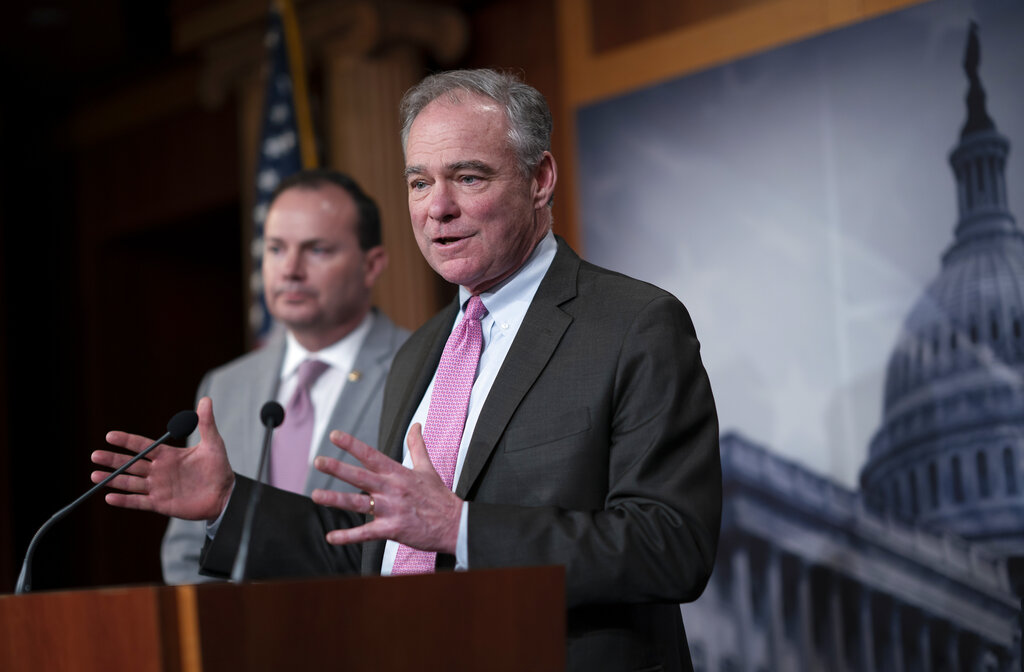
The rebuke was the Senate’s first major vote since acquitting Trump on impeachment charges last week.
Senator Tim Kaine says he has 51 votes to restrain Trump from further action on Iran
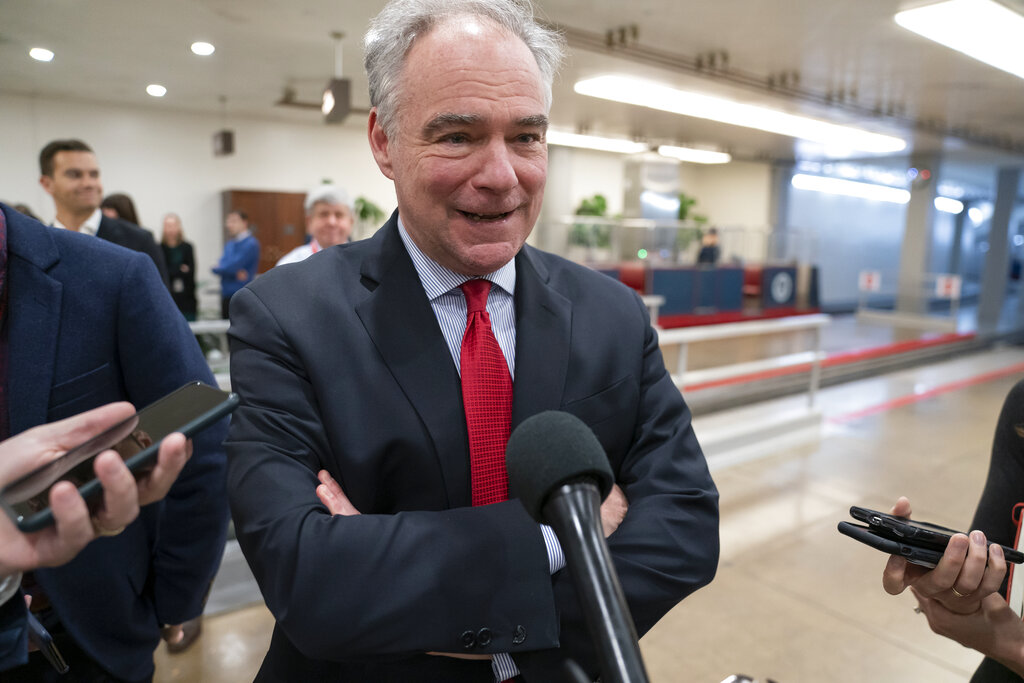
There are some Republicans in support of the measure, according to Kaine.
House Approves Measure to Restrain Trump’s Actions on Iran
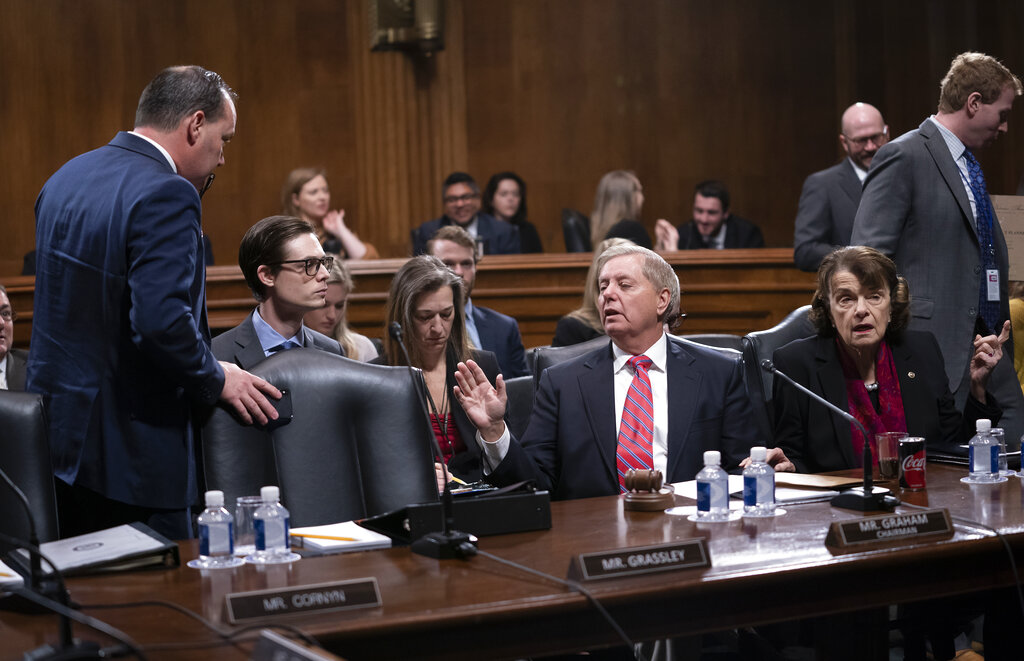
This resolution is not binding and is largely symbolic.
House to Vote on Restraining Trump’s Actions Against Iran

Republicans say the proposal does not have the force of law.
Bill to raise tobacco age has unlikely allies: Altria, Juul

Congress is moving to pass the biggest new sales restrictions on tobacco products in more than a decade, with support from two unlikely backers: Marlboro-cigarette maker Altria and vaping giant Juul Labs. The legislation would raise the minimum age to purchase all tobacco products, including electronic cigarettes, from 18 to 21 nationwide, a step long-sought by health advocates. But in the past year Juul and Altria have emerged as the biggest supporters of the measure, blanketing Capitol Hill with lobbyists and advertisements touting their support for a national “Tobacco 21” law. Tobacco critics contend the companies’ support is calculated to head off even harder-hitting government action: a ban on all flavored tobacco products, including fruit and dessert e-cigarettes. Their stance puts them in the unusual position of criticizing a move they long supported, arguing that the sales restriction isn’t enough. “Altria and Juul clearly support this in order to argue that no other action is necessary,” said Matthew Myers of the Campaign for Tobacco-Free Kids. “If you don’t eliminate the flavors that the industry has used to fuel the epidemic, you won’t solve the youth e-cigarette crisis.” The bipartisan legislation, supported by Senate Majority Leader Mitch McConnell of Kentucky, has been attached to a package of must-pass spending bills that will keep the government running into next year. Juul and Altria — the vaping company’s biggest investor — threw their support behind the bill earlier this year amid a backlash against e-cigarettes at the local, state and national levels. E-cigarettes are battery-powered devices that typically heat a flavored nicotine solution into an inhalable aerosol. Current federal law prohibits sales of e-cigarettes and all other tobacco products to those under 18. But more than one in four high school students report vaping regularly, according to the latest government figures. And health officials have called the vaping trend an “epidemic.” Until September, Juul argued that its sweet flavors — including mango, mint and fruit — could help adult smokers switch from traditional cigarettes to vaping. But the company dropped that message as President Donald Trump announced plans to remove virtually all vaping flavors from the market, due to their appeal to children. The Silicon Valley company has halted sales of all but two of its flavors, menthol and tobacco, and pledged not to oppose Trump’s plan. But momentum for the nationwide ban has faded amid push-back from vaping advocates and some conservative groups. And Trump has voiced support for alternative approaches to keep e-cigarettes away from kids, including raising the purchase age to 21. The age hike is expected to limit the supply of all vaping and tobacco products in high schools by putting them out of reach to 12th graders. Myers’ group and other health advocates say Congress should both raise the age limit and ban all “kid-friendly” flavors. Even with most of Juul’s flavors off the market, smaller companies continue to market an array of flavored products, including “grape slushie,” “strawberry cotton candy” and “sea salt blueberry.” And the industry’s main trade association is suing to keep e-cigarettes, including flavors, widely available. Altria, the nation’s largest tobacco company, said it supports a “clean” Tobacco 21 bill — focused exclusively on raising the age limit — because it is the “quickest and most effective” way to address the recent surge in teen vaping. For decades previously, Altria and other tobacco companies aggressively defended the 18-year-old minimum purchase age. Juul has similarly supported legislation that raises the purchase age without touching flavors. And while the companies say they lobby separately, both quickly backed the Tobacco 21 bill introduced in May by McConnell and Virginia Democratic Sen. Tim Kaine. The companies’ support sapped attention away from other proposals that would have gone much further. For example, a bill from New Jersey Democratic Rep. Frank Pallone would have raised the purchase age to 21 and banned flavors from all vaping and tobacco products — including menthol cigarettes — and prohibited online sales. The bill was endorsed by a dozen health groups including the American Academy of Pediatrics, the American Cancer Society and the American Lung Association. “Flavors attract kids and kids are the tobacco industry — including the e-cigarette industry’s — future,” said Erika Sward, a vice president with the American Lung Association. But efforts to advance flavor restrictions in the Senate fell flat, including a bill sponsored by Sen. Lisa Murkowski, Republican-Alaska, and Sen. Dick Durbin, Democrat-Illnois, that was withdrawn from committee consideration at the last minute. “Because I wasn’t certain that I had the votes at the time,” Murkowski told The Associated Press. “You don’t want to lose.” The logic for hiking the purchase age for cigarettes is clear: most underage teens who use tobacco get it from older friends. An estimated 90 percent of smokers start before age 18. Delaying access to cigarettes is expected to produce major downstream health benefits, with one government-funded report estimating nearly 250,000 fewer deaths due to tobacco over several decades. Still, anti-tobacco experts say age restrictions are only effective when they are vigorously enforced, and tobacco sales can fall through the cracks amid a patchwork of local, state and federal law enforcement. They point to underage drinking as an example of the limited impact of age-based restrictions. State laws banning tobacco sales to those under 18 evolved over several decades and were reinforced by a federal law in 2009. The same law banned all flavors from traditional cigarettes except menthol, which received a special exception at the behest of tobacco lobbyists. More than a third of U.S. states — including California, Illinois, New York and Texas — and the District of Columbia have already raised their minimum purchase age to 21. Anti-smoking groups have tracked the trend with measured support, noting the role of Juul and Altria lobbyists behind many of the efforts. In several cases, anti-tobacco advocates have flagged provisions that they say undercut the state laws’ effectiveness. These provisions, known as pre-emption, can stop city and county officials from imposing stricter tobacco


